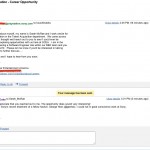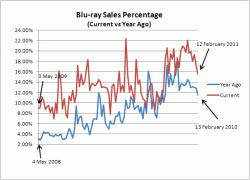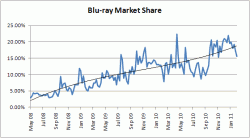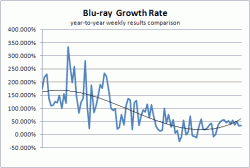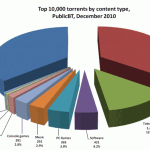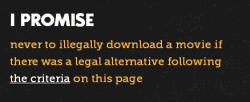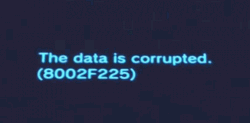I’ve had a busy week. Early on, I finished writing the review for PowerDVD 11. You’ll have to read the review to find out whether the new version of PowerDVD is worth it or not, but I really like the Android/iOS remote app, which basically turns your touch device into a touchpad for your computer. And being able to stream content from my phone to my PC through my home Wi-Fi is a lot easier than connecting via USB or Bluetooth. Pity the streaming doesn’t go the other way, from the PC to the smart device, but I’m sure Cyberlink will be sued into oblivion by the entertainment industry if they ever tried something as innovative and useful as this.
Not only that, I managed to get the April 2011 NPD US video game analysis up yesterday. That’s right, the feature is back, big time. Well, not big time, since I suspect it will go missing again next month as Sony tries to hide the PS3 sales figures. It’s actually quite funny, because if you read the April 18th edition of the WNR, I made a joke about the possible reason why Sony did not want to release PS3 sales figures for March, where it goes “This can only mean one thing, and that is that PS3 sales for March was negative – more people returned PS3s in March than people who actually purchased one #NotIntendedToBeAFactualStatement“. Not only did I write that *during* the PSN intrusion, which nobody, not even Sony, were aware of at that time, what I wrote is actually coming true, with lots of stories of people returning their PS3s. I had nothing to do with the hack, I swear! I barely even know how to use Internet banking!
And so before the FBI breaks down my door, here’s this week’s WNR, which doesn’t feature as many news stories, because there probably hasn’t been any really interesting news stories (and considering the fact that I’m not the only one writing the news these days, I’m much more certain this is the case, as opposed to everybody suddenly getting a case of the lazies).
 So staring with copyright news, and while there are only three real news stories covered this week, the second one is a real doozy. What exactly is a doozy? I have no idea. But the second story is a real one.
So staring with copyright news, and while there are only three real news stories covered this week, the second one is a real doozy. What exactly is a doozy? I have no idea. But the second story is a real one.
LimeWire settles again, this time with rights holders, for $105m. It's a much better result for LimeWire than the billions and trillions the RIAA had wanted
The first story is LimeWire’s settlement of one of their remaining lawsuits, or is this the last one, I don’t know, there are so many! LimeWire has settled with copyright holders, after settling with publishers back in March (for an undisclosed amount). Copyright holders hold the copyright on the song, while publishers hold the copyright on a recording of the song. Of course, with the way the studio system works, the same label is sometimes both the copyright holder and the publisher, so basically even with two possibly nine figure settlements, the actual artists that created the songs will probably get nothing, or if they do get something. You know, this is where I think copyright laws have gone completely out of control. If you ask an average Joe on the street, “Hey Joe, who do you think copyright laws are really meant to help?”, that person will probably say “My name is not Joe”. And then he or she will say that copyright laws, with the way they’re being used, are obvious created to help rights holders make money, and prevent nasty pirates from sharing their works without permission. But you know what Joe, you’re absolutely wrong.
The aim of copyright has always been to promote freedom of expression, the spread of culture and to promote creativity. It is not solely, as the RIAA stated when commenting on the LimeWire settlement, to help “rewards creators”, and even if that were the case, the creators are not the RIAA or the four major labels it represents. Copyright is very much a balancing game. If you don’t have copyright protection, then original works will be disseminated in a much freer fashion, and so ticks the first two of the three criteria I mentioned above. But the problem is that, and I hate to agree with the RIAA here, if the original creators are not properly rewarded for their efforts monetarily, then there is less incentive to create, especially in today’s money obsessed society. I mean, yes, some artists do art not for money, and you might even say that these are the real artists. But even real artists need to eat. And as a society, we value art and creativity, and so it’s only natural that there is a financial aspect to it.
But if you take copyright the way it is currently being used, or rather, abused by the rights holders, then you have things like DRM, DMCA take-downs, mass lawsuits, and all with the aim to lock in the profits, and not usually on behalf of the artists themselves either. It’s not a very expensive process to publish your own Blu-ray movie, due to licensing, the need to purchase DRM keys, and so how does this foster creativity for the public good. And with the major studios and labels controlling the scene, unless you’re a major artists that can negotiate your own terms, others have to put up with giving the studios and labels a large chunk of the money earned on their works, and so the current system doesn’t really “reward creators” either. Fortunately, the Internet and computing technology in general has helped to level the playing field a little bit, allowing consumers to do more with their purchased content, allowing independent artists and publishers to distribute their work without having to rely on the majors’ connections. And it’s true, piracy do hurt the independents as well, but with piracy, comes publicity, and if your work is good, really good, than you can make fans of pirates, and fans will provide financial reward, either through live performances, or a iTunes purchase to show their support for the artists (even if they’re already downloaded his or her songs). If anything, piracy means creative works are being judged on their merits more than ever now, and only the really good works will benefit financially. And isn’t that a good thing, to promote good work over bad? And it’s almost these points, the level of playing field, the greater access to the market by independents, and having to actually produce good work, that is most worrying the entertainment industry, not the money *directly* lost through piracy. They don’t want to lose their monopoly, so that artists can distribute and promote their own songs without the need for the labels and studios, and end up keeping all of their money (which is why the RIAA ordered Homeland Security to close down blogs that artists were using to leak songs and promote their music). They’re afraid that one day, artists will wake up and realise that “We have the Internet now. We don’t need you any more”, and so they’re trying protect their position by law, using copyright and piracy as an excuse. What the major studios and label want is against the public interest, against what copyright stands for, and they are the real abusers of copyright laws.

If PROTECT IP is passed, the DoJ can use tax payer money to help movie studios and music labels sue websites
And they want to abuse it more, and create more laws that makes it easier to abuse copyright, which brings us to our second story. The PROTECT IP act, currently being considered in the US congress, will tip the copyright scale even more in favour of the multi-billion dollar corporations that are calling themselves “creators” these days. The details are scary, to say the least. If the bill is passed, it will authorize even more domain seizures by Homeland Security and ICE. The Department of Justice will now be authorized, to use tax payer funds, to file civil lawsuits on behalf of rights holders, to save the billion dollar corporations even more money, time, and effort, and even if the domain name or website is not hosted in the US, the Attorney General can step in and force US based search engines to remove results for the website (“site:thepiratebay.org” -> no results found), ISPs to stop providing access to the website and even financial companies to stop providing services to those websites, all on the say so of the rights holders. If the recent domain name seizures as part of Operation In Our Sites are anything to judge by, the “defendants” will have almost no way to defend themselves until their businesses have been ruined, and even after that, it will be extremely difficult. In other words, a judge is now required to make a judgement on a one sided story, presented by the full might of the US government and billion dollar corporations, and represented on the other side by nobody, and this is what due process has become. So if the RIAA spots another website that is threatening its control over artists, all they have to do is to make a phone call to the politicians that are already in their pockets via lobbying money to get exert pressure on the DoJ and the AG to act, and then that website will exist no more. That’s what due process will become, if PROTECT IP is passed (and given the lobbying cash being thrown around to both sides of politics, as expected, there’s already a lot of support for the bill).
And sometimes they don’t even have to make that phone call, because PROTECT IP will grant corporations governmental powers (hey, if they’re already people, or so the US Supreme Court says, and people run the government, why not let corporations have the powers of government as well?). Corporations can force financial service providers to cut services for websites they don’t like, much like how the government “convinced” the likes of Amazon, PayPal and Mastercard to cut service to Wikileaks. They don’t yet have the powers to force search engines to remove search results or the force ISPs to cut service to websites they don’t like, but give it time.
So if you don’t like the way PROTECT IP overreaches, now is the time to contact your congressman and senator. It probably won’t do much good, because most of them can’t understand the technical ramifications of what they’re voting for, or what they’ve already been paid to vote for, but it’s your only weapon against this monstrosity of a bill, and it is still supposedly the best weapon in a supposedly democratic society.
Another great weapon is innovation. The Internet is so innovative and allows so much innovation, the TPTB are incredibly afraid of it. And Google now follows Amazon’s lead and taking music to the cloud, much to the chagrin of the music industry. I dislike the way Google is trying to take on everything and everybody, often forgetting their core responsibilities, but putting my opinions aside, innovation is always welcomed. The service is currently in beta, and only open via invitation in the US, but like Amazon’s service, you get GBs of space online to store all your music, and the music will then be accessible everywhere there is an Internet connection, and also on Android devices of course. The music industry don’t like it because it means they can’t make people re-buy the same music half a dozen times, one for each device, so they’ve used the excuse that the service will be used to host pirated songs by individuals. So? If people have already stolen your songs, then how they play those songs should be the least of your concern, I would think. On the other hand, if the music industry had embraced the Internet instead of being afraid of it, they could have launched their own similar service, charged people for it, and kept a lid on copyright issues through policing. And make a bundle out of it as well. At least the movie industry are looking at UltraViolet, which would do something similar with movies, but even better because you don’t even have to download anything if you don’t want to (stream it right after you buy it), which is kind of a necessity with GB sized movies really. But the RIAA will sue Amazon and Google, and probably Apple too, and anyone daring to give consumers more freedom as to what they can do with the purchased content.
Not much happening in HD news, and I’m already over my word count with only three stories covered, so I’ll skip this section for the week.
![]()
But there’s still gaming, and of course, there’s still the PSN thing. The story out now is that the PSN is slowly coming back online, and so we’ll start to find out just what kind of compensation Sony will be providing for the more than three weeks of downtime.
It will most likely be a free PSN game or two (and I really hope they don’t make it so people have to input their credit card numbers to get the free games, because that would be kind of perverse), free identity theft protection for a year (it’s never a good thing when a company has to do something like this), and a free trial of PlayStation Plus. Sony, during the week, sent letters to game publishers which provided a bit more information on how the hack went down, including the interesting fact that they company didn’t even know they were being hacked until the servers went down from too much hacking (or data transfer, probably), and that hackers managed to hide their tracks by deleting logs, which probably didn’t have real time log monitoring and offsite log retention, which could have allowed Sony to detect the problem earlier, and to have clues as to what the hackers had done.
Of course, for some, nothing can make up for the lost in trust, from comments right here on Digital Digest, to comments I’ve read in other public and private forums, this latest incident appears to be the straw that breaks the camel’s back (except it’s more like a bale of straw, given the magnitude of this f***-up). The same comments have people saying they’re trading in their PS3s for Xbox’s, and there are news reports floating around with retailers also reporting the same thing, but you know, for every person that does the trade in, there are probably tens and hundreds that are not keeping their PS3, but every little bit hurts Sony, especially since they’re locked in a bitter battle with the Xbox 360 for global dominance, even if they’ve appeared to already have lost the battle in the US (the PS3 is now comfortably third in total sales in the US).
If Sony wants to get back into the game, if you excuse pun, then they have to admit that it isn’t just this single incident that has made people reconsider Sony, as a brand. It’s the DRM rookit, the alienation of the hacking community that was once your greatest supporter, thanks to OtherOS. If is the same community that you should have embraced instead of sued, after they discovered your flawed security system, to help you make your system more secure, and perhaps bring OtherOS back as a open source project that will require no financial commitment from Sony (if that was what they were really worried about). And it’s also the arrogance, in their advertising campaigns and slogans. “It only does everything?” Yeah, it did do everything, except a lot of the things you wanted it to do, and it was just unfortunate that it did a lot of things for hackers too. The whole Sony Knows Best attitude has to go, they have to become a much humbler company that truly puts customers first. To go back to the Sony that fought bitterly for our rights in the Universal vs Betamax case, the same Sony that revolutionized portable music via the Walkman, the same company that ended the Nintendo/Sega hegemony with the PlayStation. Do all of that, and they can stop becoming one of the most hated companies in the world. If you make Microsoft look like the good guys, and if you lose to a console that used to have a 1-in-3 fault record, then you’re doing something really really wrong.
Speaking of the devil, the Xbox 360 may be getting a dashboard update next week, which only seems to add PayPal support. But with Netflix Kinect support, Hulu Plus (with Kinect), and Avatar Kinect all coming recently, perhaps the good old “Spring Update” isn’t as an important occasion as it used to be. Either that, or Microsoft are too busy reinforcing their online security to bother with adding more features. I suspect many web companies that hold a lot of credit card info have done the same in the last few weeks, and so I guess that’s the silver lining out of the PSN fiasco (the silver lining is for other companies though, not for Sony).
Alright, already too much ranting this week. Got to save up something for next week, so until then, have a good one!




